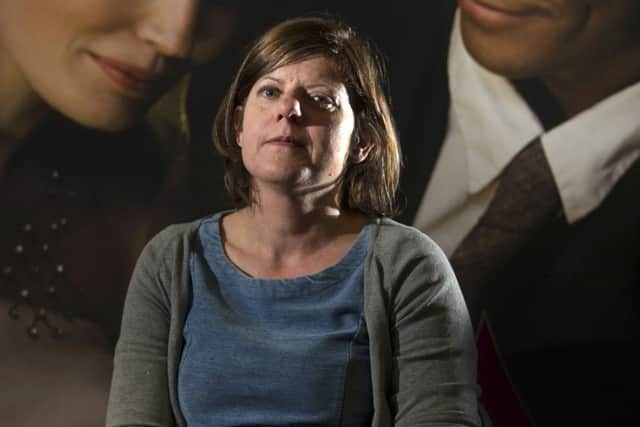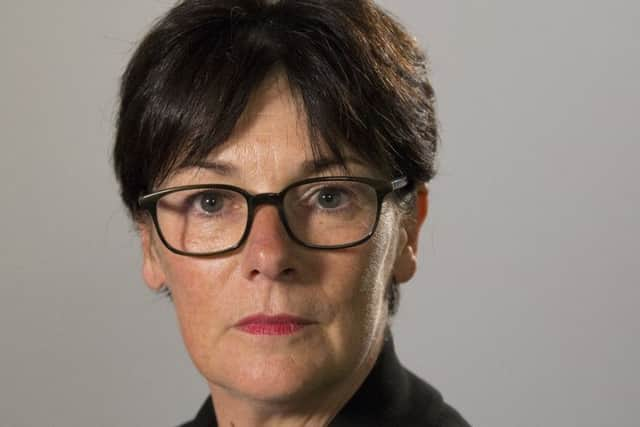Insight: Forcing rape victims to testify tips the scales


Long delays, caused in part by the mislaying of her file, meant it took two years and two months for her case to reach court; and every single day she worried about what lay ahead.
“I had never been in a court before so the whole process was alien to me,” she says now. “I kept playing the same worst case scenario in my head. I would imagine standing in front of all those people and worry about the questions I might be asked. It was constant. It took over my life.”
Advertisement
Hide AdAdvertisement
Hide AdIn the end, Jessica’s days in the witness box were not as tough as she had feared; she was given a screen so she was shielded from the accused. She was not – like some complainers – grilled too intensively on what she was wearing or how much she drank on the night in question. But it was nevertheless traumatic to give evidence in front of strangers who had already seen graphic pictures of her injuries. “I’m not normally a nervous person,” she says, “but I was having to talk about something terrible that had happened to me and I am quite private in that sense, so it was just that experience of standing with the jury and the judge and the clerk and the advocates all looking at me. It was horrible.”


After leaving the stand, the 26-year-old remained in court; she had no memories of the night in question, having woken up to find herself in a pool of blood, and hoped to fill in some gaps by sitting through the rest of the case. Unfortunately, this meant hearing the defence QC present her as liar, after which the jury returned a not proven verdict.
Jessica describes herself as strong-willed. There was never any question of her not seeing the case through to the end, but she understands why others might feel unable to continue. “It was very hard,” she says. “At the beginning, they kept telling me the case was so difficult it might never get to court. I can see if you were vulnerable you might find it all too much and decide you didn’t want to continue.”
Every year, a significant proportion of complainers do withdraw from rape cases. A recent report by the Inspectorate of Prosecutions revealed the victim’s disengagement was the key factor in 31 per cent of the 207 cases that were discontinued after the accused had appeared on petition in 2014/15. Describing women’s experience of rape trials as “secondary victimisation”, the report criticised, among other things, the length of time taken for cases to come to court, failures in communication and arrangements being changed at short notice.
A stark example of how cruel the judicial process can be came in 2002, when 17-year-old Lindsay Armstrong took her own life two weeks after being humiliated in the witness box while giving evidence against a 15-year-old boy who raped her near her home in New Cumnock, Ayrshire. At one stage, she had been asked to hold up the G-string she had been wearing.


The teenager’s suicide sparked an overhaul of the system, but last week Lindsay’s mother Linda said she felt women were still being traumatised by the experience. “It is quite sad that there is still plenty of chance for people to go through what Lindsay went through,” she said.
Nonetheless, for the past decade, rape complainers in Scotland have had unlimited control over whether or not they continued to cooperate with the case. In contrast to all other crimes – including physical domestic violence – victims of rape or sexual assault could not be compelled to give evidence. The Crown Office and Procurator Fiscal Service (COPFS) along with advocacy workers from Rape Crisis Scotland (RCS) would do everything they could to keep them engaged in the process. But if there came a point where they felt they could not continue, that was their choice.
Last month, however – just before the trial of the man accused of raping Jessica began – a change in policy was announced. From now on the decision on whether or not rape victims would be required to give evidence would rest with the COPFS. In other words, if the Crown believed it was in the public interest to compel a reluctant complainer to testify, they could issue a warrant forcing her to appear. And if she failed to appear on that warrant, she could be jailed for contempt of court.
Advertisement
Hide AdAdvertisement
Hide AdThe reasons for the policy change are straightforward. Though, in the majority of cases the wishes of the victim will continue to take priority, Solicitor General Alison Di Rollo believes there are some cases – think John Worboys, the London taxi driver who drugged and raped women – in which the non-prosecution of a perpetrator could put other women at risk. In those cases, a victim might be compelled to testify to try to ensure he was taken off the streets.
Another consideration is the number of Scottish cases which rely on the Moorov Doctrine: the principle by which separate offences closely related in time, place and circumstances can be used to corroborate one another. In such cases, the withdrawal of one victim may result in the case folding and leave the remaining victim or victims with no recourse to justice.
For RCS, however, the change of guidelines is a backward step with the potential to inflict huge damage on already vulnerable women and further reduce the number of cases that make it into a courtroom.
They believe the fear – founded or otherwise – that they might not be able to opt out at a later date may discourage some women from reporting their rapes, while others, who are desperate to withdraw, may be tempted to say their original allegations were false, putting them at risk of prosecution. In the worst-case scenario, women might attempt to take their own lives in a desperate attempt to avoid the court room.
At a heated members debate at Holyrood, during which Di Rollo refused to guarantee no rape victim would ever be jailed for refusing to testify, former Scottish Labour leader Kezia Dugdale read out the testimony of one woman who had taken the decision to withdraw from proceedings the day before the new policy was announced.
“I am faced with the reality that there is a possibility they might force me to give evidence,” she told her. “Living every day with that possibility is terrible. I know it may be unlikely, but I can’t help thinking of the worst case scenario.
“If I was to go back and have the choice to report, knowing there would be no guarantee I could withdraw if it became too much to cope with, there is a good chance I would make the decision not to report at all.”
In the past few years, the relationship between the Crown Office and RCS has been largely positive. Though, as the Inspectorate report demonstrates, the justice system is still failing rape victims on multiple levels, COPFS signed up to all the recommendations contained within it and helped feed into the Equally Safe strategy of the Scottish Government and Cosla, aimed at eradicating violence against women and girls.
Advertisement
Hide AdAdvertisement
Hide AdBut RCS claims they were consulted only once on the new “reluctant complainers” guidelines in August and heard nothing more about it until the announcement in March.
“The Crown are saying [compulsion] would only be used in exceptional circumstances but how can someone be assured their circumstances aren’t exceptional? How do they know they won’t be the ones who will have a warrant served?” says RCS chief executive Sandy Brindley. She tells me some of the women she has worked with in the past withdrew because they were suicidal.
Dugdale is angry that the Crown Office has chosen to focus on changing the guidelines on reluctant complainers rather than improving the system so they don’t disengage in the first place.
“I am of the view that no rape victim should ever be compelled to give evidence,” she says. “The reality is there is a mountain of things that could and should be done before you contemplate this course of action.”
In her office on Chambers Street, Di Rollo is clearly rattled by the backlash in both Holyrood and the newspapers. Over a cup of tea, she tells me of the first rape trial she ever prosecuted in 2008. On that occasion, the victim had written a letter to say she had moved on with her life and no longer wanted to pursue the case.
“We talked to her and she re-engaged,” says Di Rollo. “At the trial, I asked her: ‘Do you want to be here?’ She said: ‘No’. I asked her: ‘Did he rape you?’ She said: ‘Yes.’ This was a man who had posed as taxi driver to abduct her. He was convicted so the risk of him doing it again was removed. But I think that case made me determined that we do all we can as prosecutors to bring perpetrators of rape to justice; it is fundamentally important to society.”
Di Rollo says the guidelines on reluctant complainers were “reset” because the Crown Office realised there was a lack of alignment between the treatment of victims of domestic abuse, who could be compelled to testify, and victims of sexual violence, who could not, even though there was so much overlap between the two groups of victims. She also believes that if perpetrators know victims can be compelled to testify against their will they are less likely to put pressure on them to withdraw from the process.
Di Rollo uses hypothetical examples to illustrate how the public interest might – on rare occasions – override an individual victim’s desire to opt out. “A girl is raped at knife-point cycling home from school. She has been raped by a man who we could have prosecuted the last time he offended, but didn’t because the complainer said she didn’t want to go through with it – so he was at liberty to offend again.
Advertisement
Hide AdAdvertisement
Hide Ad“Not prosecuting may have been the right thing to do, but we didn’t have the opportunity to make that decision – it was the previous victim’s decision. Now, that’s not right. As prosecutors, we have legal obligations to protect women and children under the European Convention of Human Rights (ECHR) and, where we don’t take proceedings because the victim has disengaged, and the perpetrator goes on to commit serious offences, we may be in breach of those obligations.”
“It’s not about compelling every rape victim,” Di Rollo adds, “it’s about where the decision on prosecution lies; it has to lie with us.”
Di Rollo is at pains to stress the mental health and wellbeing of victims will continue to be a priority. Since the policy change in March, she says, around half a dozen cases have been discontinued at the complainers’ behest.
“We will always take account of how the victim feels, exploring the reasons [for her reluctance]; if those reasons are to do with the process of giving evidence, we will look at how we can support her, because, imperfect as it is, there are special measures in place in the system as it stands that may mitigate some of that.”
Di Rollo says the Crown Office will also explore whether or not the case could proceed without the victim’s evidence. She points out that the CPS in England and Wales already retains the right to compel victims to testify and that while RCS (and the feminist lobbying group Engender) are against the revised guidelines, the independent domestic abuse advocacy service Assist accepts a blanket ban on compelling victims of sexual violence to give evidence is unsustainable.
Brindley remains implacably opposed; she says she always believed the Scottish policy was more humane than the one in England and that testimony given under threat of jail is likely to be substandard.
“My strong view is that if someone is so terrified of giving evidence that you need to issue a warrant to compel them to go to court then you are never going to get the quality of evidence you need to get a conviction,” she says.
Dugdale adds: “If you are going to start pulling out the ECHR, then people also have a right to be protected from degrading and inhumane treatment. Forcing a woman into a witness box to talk about the most degrading and humiliating thing she has ever experienced in front of an audience and, then to be cross-examined – I think that’s a breach of human rights.”
Advertisement
Hide AdAdvertisement
Hide AdWhat everyone seems to agree on is the importance of working together to make the process less traumatic for rape complainers. With that in mind, Di Rollo says steps are already being taken to lessen the length of time taken for cases to get to court. A focus on reducing the pre-petition workload – cases that require further investigations before a decision on whether or not to proceed can be made – has resulted in a drop from 700 cases in 2016 to 200 today.
In addition, plans are under way for a pilot project that would allow some rape complainers to have their statements video recorded as soon as possible after the incident; these videos would then be used as evidence-in-chief at any subsequent trial, so proceedings would feel less like a memory test.
It is understood the pilot – which will involve the police, the Crown Office and RCS – is being seen as a stepping stone towards realising Lord Carloway’s vision of all victims of rape and sexual assault having their evidence and cross-examination filmed well ahead of proceedings so they do not have to appear in court.
Linda Armstrong said Lord Carloway’s proposal would have made a massive difference to her daughter. Explaining what had made Lindsay despair, she said: “It was the embarrassment and humiliation of standing in the court and having to tell a bunch of strangers what happened to her.”
Brindley would also like to see research conducted into the possibility of independent legal representation for the complainer as happens in some other European jurisdictions.
Jessica says all these changes would have lessened her own trauma. In particular, she would have liked the opportunity to have her testimony recorded to avoid the embarrassment of speaking in front of strangers; she also has an issue with the not proven verdict.
Having been denied a conviction, Jessica is now contemplating taking a civil case.
Last year, Denise Clair won a civil court ruling that footballers David Goodwillie and David Robertson had raped her after the Crown opted not to take the case through the criminal court through lack of evidence.
Advertisement
Hide AdAdvertisement
Hide AdAnd in February it emerged a former St Andrews University student was pursuing a civil case after the man she accused of raping her during fresher’s week was cleared. Civil cases are decided on the balance of probabilities rather than beyond all reasonable doubt.
Though Jessica was determined to go through with her case in the hope of gaining closure, she does not believe anyone should be forced to give evidence against their will or be jailed for refusing to do so.
“I think it’s all about having the choice,” she says. “You have so little control over what’s happening with the procurator fiscal. I would not have opted out, but I don’t think it’s right to compel someone who is vulnerable and finding it all too difficult.”
*Jessica’s name has been changed to protect her identity